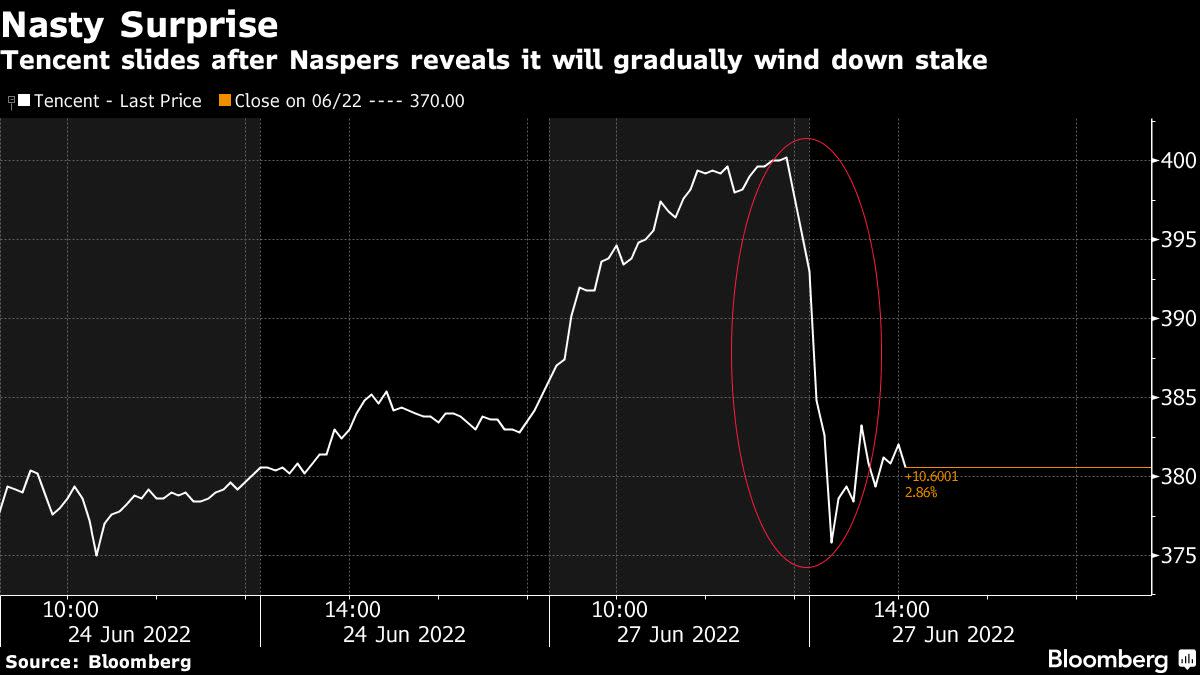Tencent Backer Prosus to Cut $134 Billion Stake to Buy Stock

(Bloomberg) — Prosus NV is planning to sell more of its $134 billion stake in Chinese internet giant Tencent Holdings Ltd. to finance a buyback program, reversing a pledge to hold onto the full shareholding.
Most Read from Bloomberg
Tencent declined in Hong Kong on Monday as investors pondered the extent to which Prosus, the Chinese company’s biggest shareholder, will unload its stock. The shares fell as much as 2.5% and traded 1.6% lower at the close.
“We will keep selling Tencent shares to buy back our own, it’s open-ended and an unlimited program,” Prosus Chief Executive Officer Bob Van Dijk said in an interview. “It’s actually a small part of Tencent daily traded volumes — it should be maximum between 3 to 5%.”
The move represents a change of heart by Dutch e-commerce giant Prosus — majority owned by South Africa’s Naspers Ltd. — which said after its last sale in April 2021 it wouldn’t offload more shares for three years. The company, spun off from Naspers in 2019, owns the 29% stake after its parent became an early Tencent investor more than two decades ago, bagging a multi-billion dollar return in one of the most profitable early bets in tech investment history.
Prosus shares soared 13% as of 11:13 a.m. in Amsterdam, the most since March, while Naspers gained as much as 18% in Johannesburg.
Less Than Zero
Prosus’s value increased to 120 billion euros ($127 billion) after the share jump, narrowing a long-standing discount to the $134 billion Tencent stake. The discrepancy means the market values the rest of the company’s assets, which include food delivery, travel bookings and online education sites across the world, at less than zero. This state of affairs has become “unacceptable,” Prosus said, having worked for years to convince the market it’s underappreciating the company.
Prosus is “finally accepting that this is the best — and perhaps only — way to close the 30%-plus discount,” Bloomberg Intelligence analyst John Davies said in a note. “The announcement of the plan may quickly reduce the gap. Other value-creation efforts are likely to take longer, simply due to the investment horizons.”
The business reduced the full-year operating loss to $859 million in the year through March from more than $1 billion, though core headline earnings per shares — Prosus’s preferred measure of analyzing its finances — declined.
Read more: China’s Traumatized Tech Insiders Signal Danger for Market Rally
Prosus disclosed the Tencent shares plan on the same day as it reported the sale of almost $4 billion of stock in e-commerce giant JD.com Inc., received from Tencent as a special dividend. JD.com gained 6.2%.
The twin deals revive concerns around the long-term viability of holding shares in Chinese internet firms, which are only just emerging from more than a year of unprecedented scrutiny from Beijing. While Prosus’s investment remains wildly in the money, they are selling after Tencent shed roughly half its value since a 2021 peak, hammered by the government’s campaign to curb the power of its largest internet corporations.
Prosus said it will manage the sale of Tencent stock in an orderly fashion.
Read more: Tencent-Backer Prosus Unloads Nearly $4 Billion of JD.com Stock
Prosus aims to focus on increasing the value of non-Tencent assets, Van Dijk said, while retaining exposure to the Chinese company. The group is also looking for buyers for Russian classified ads business Avito following the sanctions imposed on the country after the invasion of Ukraine.
Investors are considering whether to pile back into Chinese internet stocks after a selloff that began in 2021, at one point wiping out more than $1 trillion of market value. Some analysts believe Beijing has turned more supportive of the crucial industry, but Nasper’s announcement may temper that somewhat.
Tencent said in a separate statement it supported its shareholders’ decision and expects limited impact on the Chinese social giant itself.
(Updates with analyst comment two paragraphs below ‘Less Than Zero’)
Most Read from Bloomberg Businessweek
©2022 Bloomberg L.P.




